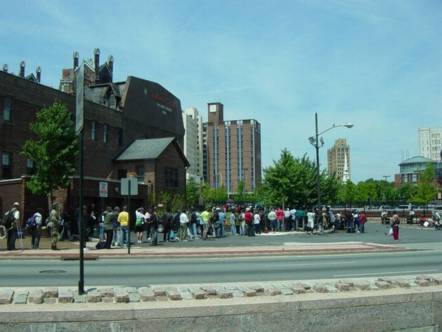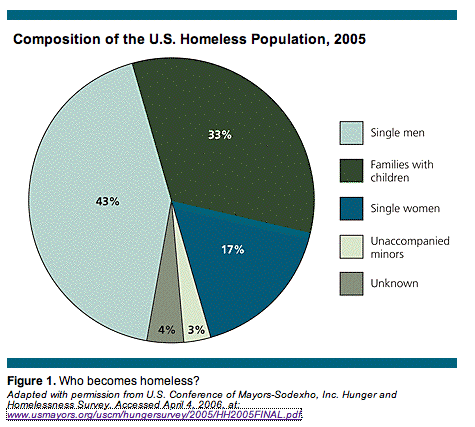Soup Line – Newark, New Jersey – 2007
Today we take a break from our usual comments on the economy and markets. We are seeing a lot of mixed signals in the data about the state and direction of the US economy, but there is one area of the US economy where the data are unambiguous: homelessness and hunger.
Below we list ten surprising facts about homelessness from the results of the most recent U.S. Conference of Mayors/Sodexho Survey on Hunger and Homelessness (pdf), a survey of America's 24 largest cities.
You might assume that mental illness is the number one cause of homelessness, that few homeless seeking food assistance are employed, and that most seeking food assistance are individuals and not families. You might assume that a nation that spends 21 billion dollars a month on a war in Iraq spends more than $420 million per year to assist its homeless, 11 percent of whom are veterans, so that few if any homeless requesting assistance are turned away. And you might think, with all the news you read about the strong and growing US economy, that homelessness is declining.
But you'd be wrong.
Ten Surprising Facts about Homelessness in the US
1) Homeless People
It is estimated that persons considered mentally ill account for 22 percent of the homeless population in the survey cities; substance abusers account for 30 percent. Fifteen percent of the homeless in the survey cities are employed in full-or part-time jobs. Eleven percent are veterans.
2) Causes of Homelessness
Listed in order of frequency: lack of affordable housing, low paying jobs, mental illness and the lack of needed services, substance abuse and the lack of needed services, domestic violence, unemployment, poverty, and prisoner re-entry.
3) Length of Time People Are Homeless
People remain homeless for an average of 7 months in the survey cities. The average length of time people remain homeless is 24 months in Phoenix, 18 months in Louisville, 14 months in Boston, 12 months in Detroit. Eighty-seven percent of the cities report that the length of time people are homeless increased. Thirteen percent report a decrease.
4) People Requesting Food Assistance
Officials in the survey cities reported that 40 percent of adults requesting emergency food assistance were employed. Across the survey cities it is estimated that 54 percent of those requesting emergency food assistance were either children or their parents.
5) Emergency Shelter Requests
Seventy-one percent of the survey cities report an increase in request for emergency shelter during the last year. Across the survey cities, the average increase was 6 percent. The increases ranged from 30 percent in Los Angeles, 28 percent in Trenton, 22 percent in Detroit, and 18 percent in Miami.
6) Emergency Shelter Requests by Families
Requests for emergency shelter by homeless families with children increased in 63 percent of the survey cities during the last year. Across the survey cities, the average increase in requests for emergency shelter by homeless families with children was 5 percent.
7) Requests for Assisted Housing by Low-Income Families and Individuals
During the last year, requests for housing by low-income families and individuals increased in 86 percent of the survey cities.
8) People Turned Away From Emergency Shelter
In 88 percent of the survey cities, emergency shelters may have turned away homeless families due to a lack of resources.
9) Forecast of Requests for Emergency Shelter during 2006
Ninety-three percent of the survey cities expect that requests for emergency shelter to increase in 2006. Ninety-five percent of the survey cities expect that requests for shelter by families to increase in 2006.
10) Requests for Emergency Food Assistance for 2006
Ninety percent of the survey cities expect that their requests for emergency food assistance will increase in 2006. During 2006 requests for emergency food assistance by families with children are expected to increase in 86 percent of the survey cities.
This report came out a year before the Center for Responsible Lending projected millions of homes may go into foreclosure over the next few years, as "2.2 million mortgage loans with a value of $164B to eventually fail."
While we worry about the stock market, bond yields, and the price of commodities, it's important to remind ourselves occasionally that while economic mismanagement may cause many of us to lose money, millions of our fellow citizens stand to lose a lot more than that.
 |
Below we list ten surprising facts about homelessness from the results of the most recent U.S. Conference of Mayors/Sodexho Survey on Hunger and Homelessness (pdf), a survey of America's 24 largest cities.
You might assume that mental illness is the number one cause of homelessness, that few homeless seeking food assistance are employed, and that most seeking food assistance are individuals and not families. You might assume that a nation that spends 21 billion dollars a month on a war in Iraq spends more than $420 million per year to assist its homeless, 11 percent of whom are veterans, so that few if any homeless requesting assistance are turned away. And you might think, with all the news you read about the strong and growing US economy, that homelessness is declining.
But you'd be wrong.
Ten Surprising Facts about Homelessness in the US
1) Homeless People
It is estimated that persons considered mentally ill account for 22 percent of the homeless population in the survey cities; substance abusers account for 30 percent. Fifteen percent of the homeless in the survey cities are employed in full-or part-time jobs. Eleven percent are veterans.
2) Causes of Homelessness
Listed in order of frequency: lack of affordable housing, low paying jobs, mental illness and the lack of needed services, substance abuse and the lack of needed services, domestic violence, unemployment, poverty, and prisoner re-entry.
3) Length of Time People Are Homeless
People remain homeless for an average of 7 months in the survey cities. The average length of time people remain homeless is 24 months in Phoenix, 18 months in Louisville, 14 months in Boston, 12 months in Detroit. Eighty-seven percent of the cities report that the length of time people are homeless increased. Thirteen percent report a decrease.
4) People Requesting Food Assistance
Officials in the survey cities reported that 40 percent of adults requesting emergency food assistance were employed. Across the survey cities it is estimated that 54 percent of those requesting emergency food assistance were either children or their parents.
 |
Seventy-one percent of the survey cities report an increase in request for emergency shelter during the last year. Across the survey cities, the average increase was 6 percent. The increases ranged from 30 percent in Los Angeles, 28 percent in Trenton, 22 percent in Detroit, and 18 percent in Miami.
6) Emergency Shelter Requests by Families
Requests for emergency shelter by homeless families with children increased in 63 percent of the survey cities during the last year. Across the survey cities, the average increase in requests for emergency shelter by homeless families with children was 5 percent.
7) Requests for Assisted Housing by Low-Income Families and Individuals
During the last year, requests for housing by low-income families and individuals increased in 86 percent of the survey cities.
8) People Turned Away From Emergency Shelter
In 88 percent of the survey cities, emergency shelters may have turned away homeless families due to a lack of resources.
9) Forecast of Requests for Emergency Shelter during 2006
Ninety-three percent of the survey cities expect that requests for emergency shelter to increase in 2006. Ninety-five percent of the survey cities expect that requests for shelter by families to increase in 2006.
10) Requests for Emergency Food Assistance for 2006
Ninety percent of the survey cities expect that their requests for emergency food assistance will increase in 2006. During 2006 requests for emergency food assistance by families with children are expected to increase in 86 percent of the survey cities.
This report came out a year before the Center for Responsible Lending projected millions of homes may go into foreclosure over the next few years, as "2.2 million mortgage loans with a value of $164B to eventually fail."
While we worry about the stock market, bond yields, and the price of commodities, it's important to remind ourselves occasionally that while economic mismanagement may cause many of us to lose money, millions of our fellow citizens stand to lose a lot more than that.
Comment